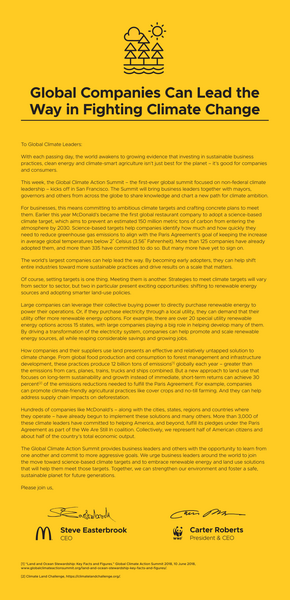
Global Companies Can Lead the Way in Fighting Climate Change
- Date: 13 September 2018
- Author: Steve Easterbrook, CEO, McDonald's and Carter Roberts, President & CEO, World Wildlife Fund
With each passing day, the world awakens to growing evidence that investing in sustainable business practices, clean energy and climate-smart agriculture isn’t just best for the planet – it’s good for companies and consumers.
This week, the Global Climate Action Summit – the first-ever global summit focused on non-federal climate leadership – kicks off in San Francisco. The Summit will bring business leaders together with mayors, governors and others from across the globe to share knowledge and chart a new path for climate ambition.
For businesses, this means committing to ambitious climate targets and crafting concrete plans to meet them. Earlier this year McDonald’s became the first global restaurant company to adopt a science-based climate target, which aims to prevent an estimated 150 million metric tons of carbon from entering the atmosphere by 2030. Science based targets help companies identify how much and how quickly they need to reduce greenhouse gas emissions to align with the Paris Agreement’s goal of keeping the increase in average global temperatures below 2° Celsius (3.56° Fahrenheit). More than 125 companies have already adopted them, and more than 335 have committed to do so. But many more have yet to sign on.
The world’s largest companies can help lead the way. By becoming early adopters, they can help shift entire industries toward more sustainable practices and drive results on a scale that matters.

As printed in the San Francisco Chronicle, Sept. 13 2018
Of course, setting targets is one thing. Meeting them is another. Strategies to meet climate targets will vary from sector to sector, but two in particular present exciting opportunities: shifting to renewable energy sources and adopting smarter land-use policies.
Large companies can leverage their collective buying power to directly purchase renewable energy to power their operations. Or, if they purchase electricity through a local utility, they can demand that their utility offer more renewable energy options. For example, there are over 20 special utility renewable energy options across 15 states, with large companies playing a big role in helping develop many of them. By driving a transformation of the electricity system, companies can help promote and scale renewable energy sources, all while reaping considerable savings and growing jobs.
How companies and their suppliers use land presents an effective and relatively untapped solution to climate change. From global food production and consumption, to forest management and infrastructure development, these practices produce 12 billion tons of emissions globally each year – greater than the emissions from cars, planes, trains, trucks and ships combined. But a new approach to land use that focuses on long term sustainability and growth instead of immediate, short-term returns can achieve 30 percent of the emissions reductions needed to fulfill the Paris Agreement. For example, companies can promote climate-friendly agricultural practices like cover crops and no-till farming. And they can help address supply chain impacts on deforestation.
Hundreds of companies like McDonald’s – along with the cities, states, regions and countries where they operate – have already begun to implement these solutions, and many others. More than 3,000 of these climate leaders have committed to helping America, and beyond, fulfill its pledges under the Paris Agreement as part of the We Are Still In coalition. Collectively, we represent half of American citizens and about half of the country’s total economic output.
The Global Climate Action Summit provides business leaders and others with the opportunity to learn from one another and commit to more aggressive goals. We urge business leaders around the world to join the move toward science-based climate targets, and to embrace renewable energy and land use solutions that will help them meet those targets. Together, we can strengthen our environment and foster a safe, sustainable planet for future generations.
_______________________________________________________________________________________________________
This was originally published as an open letter in the San Francisco Chronicle.